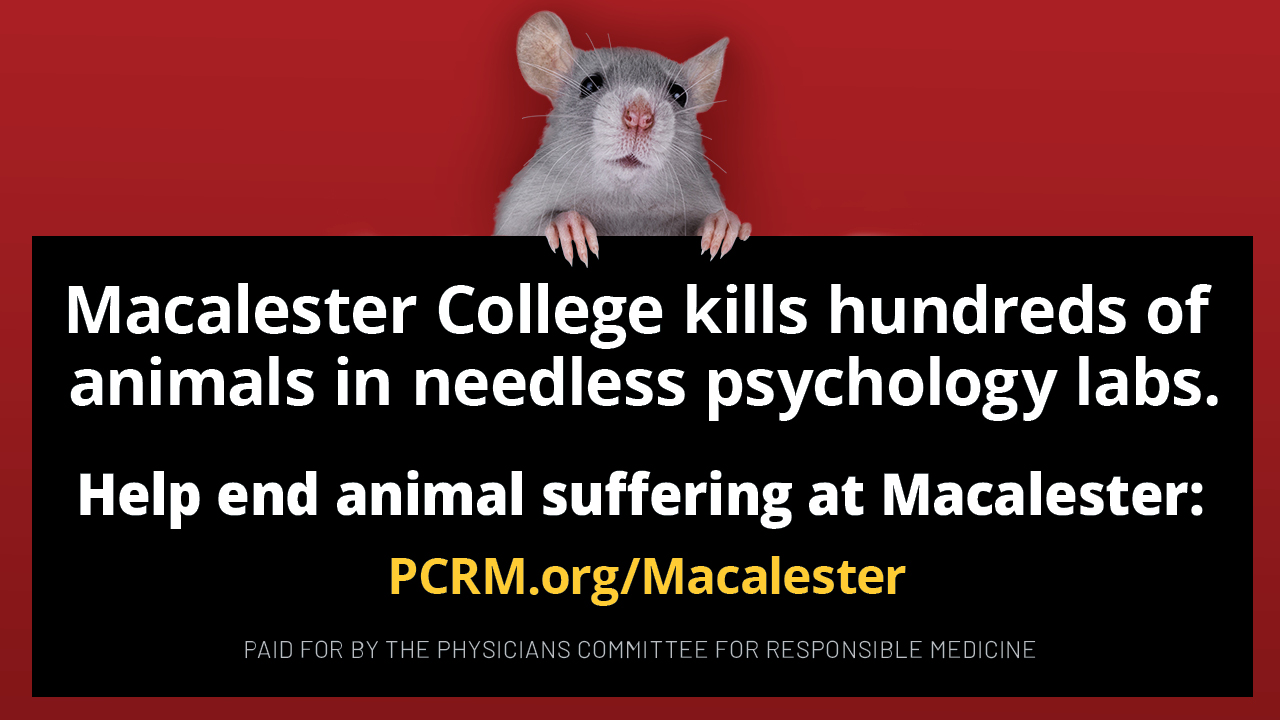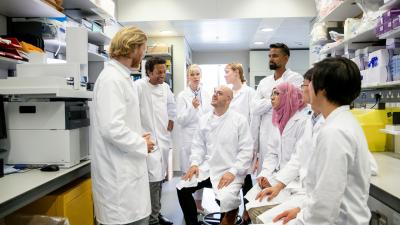Physician to Appeal Dismissal of Case Challenging Macalester College's Fatal Animal Experiments

ST. PAUL, Minn.—Dr. Neal Barnard, the Macalester College alumnus and plaintiff in the case against the school for its outdated “show and tell” animal laboratories announced his plans to appeal an Oct. 28, 2025, Hennepin County District Court decision affirming the school’s motion to dismiss.
The case against Macalester, originally filed in June, accuses the College of having killed thousands of animals to teach elementary concepts in psychology, despite the availability of nonanimal alternatives and despite the College’s posted statements that it applies the highest ethical standards. Macalester is among the few (and perhaps the only) colleges in the state to continue to use animals in introductory psychology classes. It has done so for more than 50 years, while superior nonanimal lesson plans have been adopted by others. The College has falsely asserted that the laboratory exercises were “irreplaceable,” despite the fact that Harvard, Yale, Stanford, Carleton, St. Olaf, St. John’s, Hamline, the University of Minnesota, and most other colleges and universities replaced such laboratories years ago. Macalester admitted to the court that its ethics statements were not sincerely held but were “at most, ‘vague or highly subjective’ statements.”
Dr. Barnard, the alumnus who has brought the lawsuit, presented the court with evidence of the College’s consistent pattern of misleading statements about its animal use. In the college newspaper, The Mac Weekly, on Sept. 25 of this year, the psychology department was cited as saying the introductory psychology class “did not involve killing animals through experimentation” and “no rodents are killed during Introduction to Psychology courses,” apparently suggesting the animals would survive. What was left unsaid was the fact that the animals can be killed out of sight by laboratory personnel.
Dr. Barnard also raised concerns about the College’s coercive and intimidating statements that compassionate students who opt out of the animal laboratory miss an irreplaceable experience that informs their future studies, “something we consider essential preparation for future scientists and informed citizens alike.” The statement would have the likely effect of pressuring students into participating in activities many find ethically unacceptable.
Dr. Barnard pointed out that, in a broadcast by the Association of Minnesota Public Educational Radio Stations, Aug. 5, 2025, a Macalester psychology student discussed her emotional reactions and those of a friend in response to the animal laboratory. As a result of the College’s behavior, she “asked to remain anonymous and feared she could get in trouble with the department.”
A recent survey showed that 83% of college students nationwide object to the use of animals when alternatives are available and the animals will be killed. Many of the surveyed students indicated they would participate in the animal laboratories anyway “to avoid problems” (20%), and others (24%) indicated they would be nervous asking for an alternative.
“Macalester’s curriculum is obsolete, cruel to animals, and coercive to students,” Dr. Barnard said. “Students do not need to experiment on animals, do not need to be pressured, and do not need to be misled. There are better methods, and the College should use them.”
Dr. Barnard graduated magna cum laude from Macalester in 1975, having majored in psychology. Learning that the College was still conducting out-of-date animal experiments 50 years later, he presented details to the College in 2024 on more modern teaching methods in use elsewhere. Believing the College was indeed examining ways of modernizing its instruction, Dr. Barnard raised money to support the school and donated personally. However, Macalester president Suzanne Rivera abruptly terminated the curriculum discussions and directed Dr. Barnard to the College’s litigation attorneys.
The issue of coercing students into committing unethical acts was highlighted by Yale University’s Stanley Milgram, whose infamous experiments instructed students to administer what they were told were electrical shocks to research participants, and most did so, despite believing that the shocks were painful and even potentially life-threatening. The resulting stress led some participants to complain directly to Milgram or to the university. Like Milgram’s experiments, the Macalester faculty is deceptive regarding the necessity of using animals and uses language to encourage participation. Unlike Milgram’s experiments, however, the harm to animals at Macalester is real, consisting of privation and chronic confinement beforehand and death afterward. Apart from the fact that negative emotions during the laboratory exercise interfere with learning, many students experience long-term stress and regret following participation in unnecessary animal laboratory exercises.
“Medical schools dropped animal labs from their curricula years ago,” Dr. Barnard said. “Mac should, too.”
Media Contact
Michael Keevican
202-527-7367
mkeevican[at]pcrm.org
Founded in 1985, the Physicians Committee for Responsible Medicine is a nonprofit organization that promotes preventive medicine, conducts clinical research, and encourages higher standards for ethics and effectiveness in education and research.







